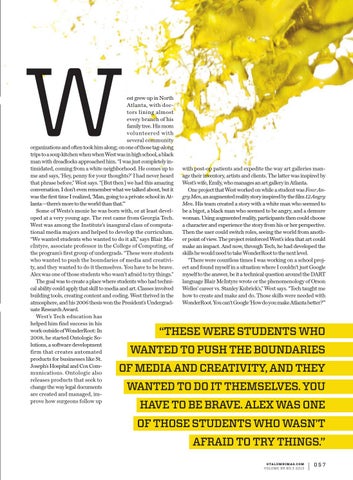W
est grew up in North Atlanta, with doctors lining almost every branch of his family tree. His mom volunteered with several community organizations and often took him along; on one of those tag-along trips to a soup kitchen when when West was in high school, a black man with dreadlocks approached him. “I was just completely intimidated, coming from a white neighborhood. He comes up to me and says, ‘Hey, penny for your thoughts?’ I had never heard that phrase before,” West says. “[But then] we had this amazing conversation. I don’t even remember what we talked about, but it was the first time I realized, ‘Man, going to a private school in Atlanta—there’s more to the world than that.’” Some of Wests’s moxie he was born with, or at least developed at a very young age. The rest came from Georgia Tech. West was among the Institute’s inaugural class of computational media majors and helped to develop the curriculum. “We wanted students who wanted to do it all,” says Blair MacIntyre, associate professor in the College of Computing, of the program’s first group of undergrads. “These were students who wanted to push the boundaries of media and creativity, and they wanted to do it themselves. You have to be brave. Alex was one of those students who wasn’t afraid to try things.” The goal was to create a place where students who had technical ability could apply that skill to media and art. Classes involved building tools, creating content and coding. West thrived in the atmosphere, and his 2006 thesis won the President’s Undergraduate Research Award. West’s Tech education has helped him find success in his work outside of WonderRoot: In 2008, he started Ontologic Solutions, a software development firm that creates automated products for businesses like St. Joseph’s Hospital and Cox Communications. Ontologic also releases products that seek to change the way legal documents are created and managed, improve how surgeons follow up
with post-op patients and expedite the way art galleries manage their inventory, artists and clients. The latter was inspired by West’s wife, Emily, who manages an art gallery in Atlanta. One project that West worked on while a student was Four Angry Men, an augmented reality story inspired by the film 12 Angry Men. His team created a story with a white man who seemed to be a bigot, a black man who seemed to be angry, and a demure woman. Using augmented reality, participants then could choose a character and experience the story from his or her perspective. Then the user could switch roles, seeing the world from another point of view. The project reinforced West’s idea that art could make an impact. And now, through Tech, he had developed the skills he would need to take WonderRoot to the next level. “There were countless times I was working on a school project and found myself in a situation where I couldn’t just Google myself to the answer, be it a technical question around the DART language Blair McIntyre wrote or the phenomenology of Orson Welles’ career vs. Stanley Kubrick’s,” West says. “Tech taught me how to create and make and do. Those skills were needed with WonderRoot. You can’t Google ‘How do you make Atlanta better?’”
“THESE WERE STUDENTS WHO
WANTED TO PUSH THE BOUNDARIES
OF MEDIA AND CREATIVITY, AND THEY WANTED TO DO IT THEMSELVES. YOU HAVE TO BE BRAVE. ALEX WAS ONE
OF THOSE STUDENTS WHO WASN’T AFRAID TO TRY THINGS.” GTALUMNIMAG.COM VOLUME 89 NO.3 2013
Vol89 No3 Features 8-14-13.indd 57
057
8/14/13 5:58 PM
